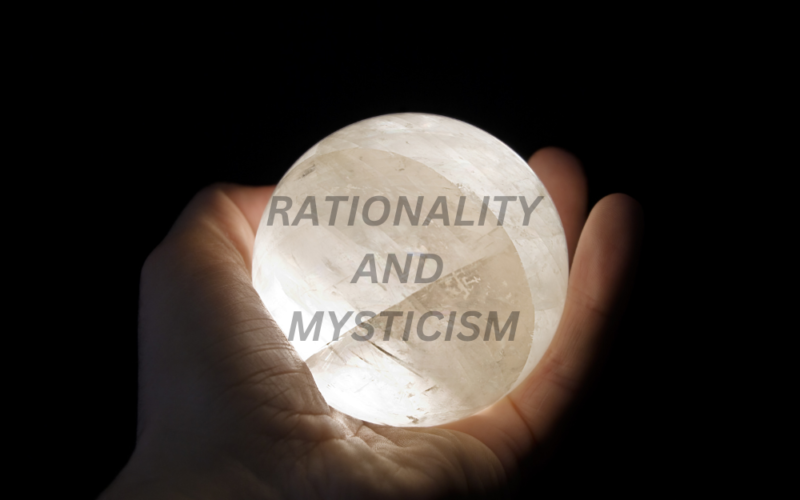I am often intrigued by the relationship that exists between rationality and mysticism. To begin with, there is some community of purpose between the two. However, a mystic’s method is very different.

A mystic has a distrust of all discursive and analytic knowledge. He believes, based often on his direct experience, that there is a higher knowledge than mere analytic knowledge and this higher knowledge alone is capable of affording an insight into the inner meaning of things which it is not possible to gain otherwise. For instance, at times some of us, under the power of an inward passion, experience a sudden feeling of insight into objects, discovering the hidden meaning. The tenets of faith and belief to which the mystics adhere are arrived at independently of any analytical process, and reasoning that we see in their writings comes post facto in support to the conviction which mystics lend to the infallibility of higher knowledge. Bertrand Russell explains it thus: “Reality is regarded by them with an admiration often amounting to worship. It is felt to be always and everywhere, close at hand, thinly veiled by the show of sense.”
Mystic claims to know of that knowledge besides which all other knowledge is ignorance. Instead of trying to explain the relationship of reality with appearance, a mystic is in communion with reality. A rationalist, on the other hand, has complete faith in the powers of cognition and the supremacy of intellect and relies on the knowledge gained through the intellectual method. He is reluctant to repose trust in the so-called higher knowledge.
While I will not attempt to challenge the limitations of analytic knowledge pointed out by philosophers, mystics, and some others, I have the right to make some general observations of critical nature. First of all, the intellect has never claimed it can know all. Instead it knows that all that is beyond experience cannot be known. However, I contend that within the setting of our human experience intellect can supply precise and firm knowledge. In my view, whether or not intellect provides precise and firm knowledge depends more on our desire to exclude other conscious and unconscious motives that contaminate the liberation of our intellectual powers than on proper application of our powers of thought or perfection of our techniques of reasoning. Even the hackneyed declaration that there are things that our intellect cannot know assumes that we know enough of these things to be certain that they cannot be known. Man has a natural impulse to fall for pleasant and sugarcoated myths. We must always watch out against embracing the attractive and satisfying falsehoods as if they were the exact revelation of God’s Truth.
Here, as an example, I would like to examine the criticism of intellect made by William James, one of the wisest men to have lived. William James argues that intellect is inadequate to understand the true nature of human experience. In his book “The Varieties of Religious Experience”, William James concludes that it is impossible to demonstrate, by purely intellectual process, the truth of the deliverance of direct religious experience. His key argument is that conceptual processes can define and interpret facts but they do not produce them nor can they reproduce their individuality. There is always a plus which feelings alone can answer. William James writes as follows:
“The spontaneous intellect of man always defines the divine which it feels in ways that harmonize with its temporary intellectual prepossessions. Philosophy can, by comparison, eliminate the local and the accidental from these definitions. Both from dogma and from worship she can remove historic incrustations. By confronting the spontaneous religious constructions with the results of natural science, philosophy can also eliminate doctrines that are now known to be scientifically absurd or incongruous.”
Now as we see above, William James echoes the familiar distrust of intellect that it is not able to render into a conceptual framework the essence of mystical, religious, or spiritual experiences. To me the central fault in this mode of thinking is the failure to distinguish between the symbol and the things it symbolizes. It is true that the quality of life as breathed, of love as felt, of time as lived, cannot be adequately represented by any conceptual process. But at the same time it is intellect only that develops a language of pointers to the meaning of experience. For example, writing the word ‘white’ in black does not alter the meaning of the word ‘white’. Or a line AB drawn to show the distance between the two points A and B does not represent the experience of physical continuity by travelling between the two points.
Therefore, all attacks against intellect miss the mark. Intellect allows us to capture the essential framework of experience. The experiences that cannot be fully represented in the language of concepts are then symbolized by intellect so that they may serve as signs for any other projected or possible experience. Doubts about the power of intellect inevitably involve the assumption that the intellect has the capacity of showing that it cannot be trusted, which in turn means that its deliverances are trustworthy. All criticism against intellect, therefore, is unwittingly carried out by the Intellect.
The role of intellect is to disentangle in the present experience, the sign of experience that is not present. Whether or not it succeeds in doing so has no relevance to the nature of its activity that proceeds by trial and error. Some beliefs can be verified by an appeal to facts, whereas some other beliefs lie beyond experience and cannot be checked. Intellect does not transcend experience. Only the relation to experience can check the validity of answers. But the important difference is that intellect exercises a direct control of experience. Hence, often it pulls up stern contradictory experiences and chastises the ‘Truth’ fancied by the mystics or the religious. Throughout history false cognitions have been questioned and corrected by intellect and we and our children will continue to do so. The ‘Lies’ –big or small- will continue to be found out.

The Intellect has faith in reflective and analytic knowledge and, unlike the mystic, is not content merely with achieving communion with reality and stopping there. Intellect tries to discover and formulate the relationship that reality has with the world of appearances. Instead mystic’s aim is to seek satisfaction of his emotional nature more than the intellectual and he uses the language of nebulous imaginative symbolism designed to suggest an unanalyzed state of consciousness. Mysticism, therefor, has never succeeded in advancing the cause of human knowledge because its knowledge cannot be transferred. Intellectual knowledge, on the other hand, can be accurately maintained and passed on from generation to generation. The mystical literature of mankind is not a literature of accurate information. Mystics can realize a higher state of life through their devotion but the intensity of feeling and the depth of experience which they realize in their consciousness cannot be transferred to others. Thus the rest of the mankind does not share the benefits that may have accrued to them. A mystic is satisfied with a lower type of immediacy of experience whereas a scientist, for instance, achieves a higher type of immediacy through the critical and analytical knowledge he adopts towards that immediacy of experience with which a mystic remains contented. For a rational mind the regard for truth should decide any issue on hand and no prejudice shall be allowed to prevail upon knowledge. Rationality will free us from superstition, from blind beliefs, and from the unconscious life of animals. It is possible that our knowledge, in the end, will show us the limitations of our understanding. It is possible that after enough scientific studies we may be convinced that these deeper convictions, of which poets and mystics have spoken, about the liberty and immortality of the soul and about the destiny of man are after all no better than mere subjective illusions inculcated in us by circumstances over which we have no control. But then, at least, we will possess the confidence that we have put in our utmost efforts to study the mysteries of our inner life and the secrets of the external world and, having done what we could do, as rational beings, we should accept whatever insignificant position we are logically compelled to for human life and its destiny in the scheme of things. To think freely, unburdened by any consideration except that of truth, is a privilege unique to man and we must exercise that prerogative to create a state of being higher than the mere life of the animals. The passion for knowing and discovering truth exercised with our deepest intuitions will lead us on from darkness to light and from light to sun. It will yield us an intellectual attitude to life and its problems.







